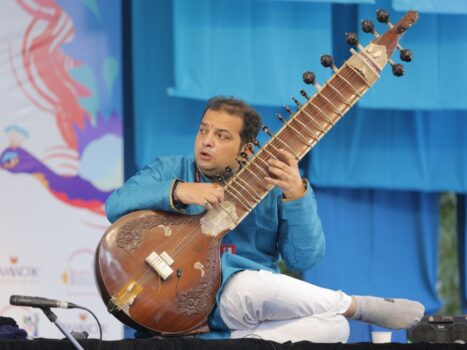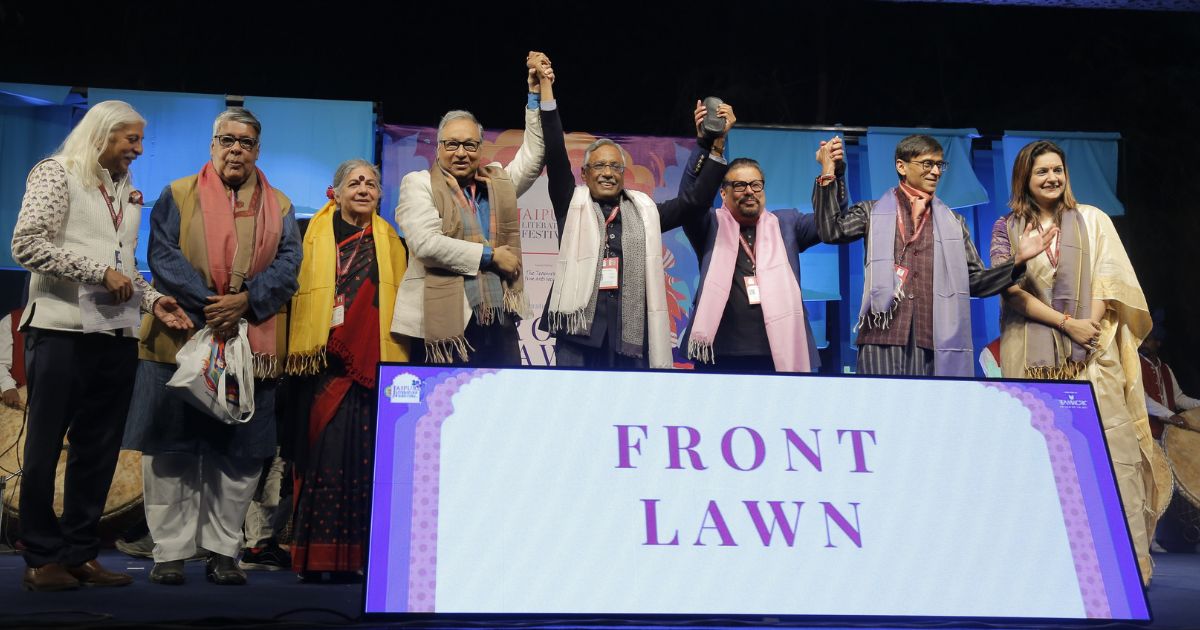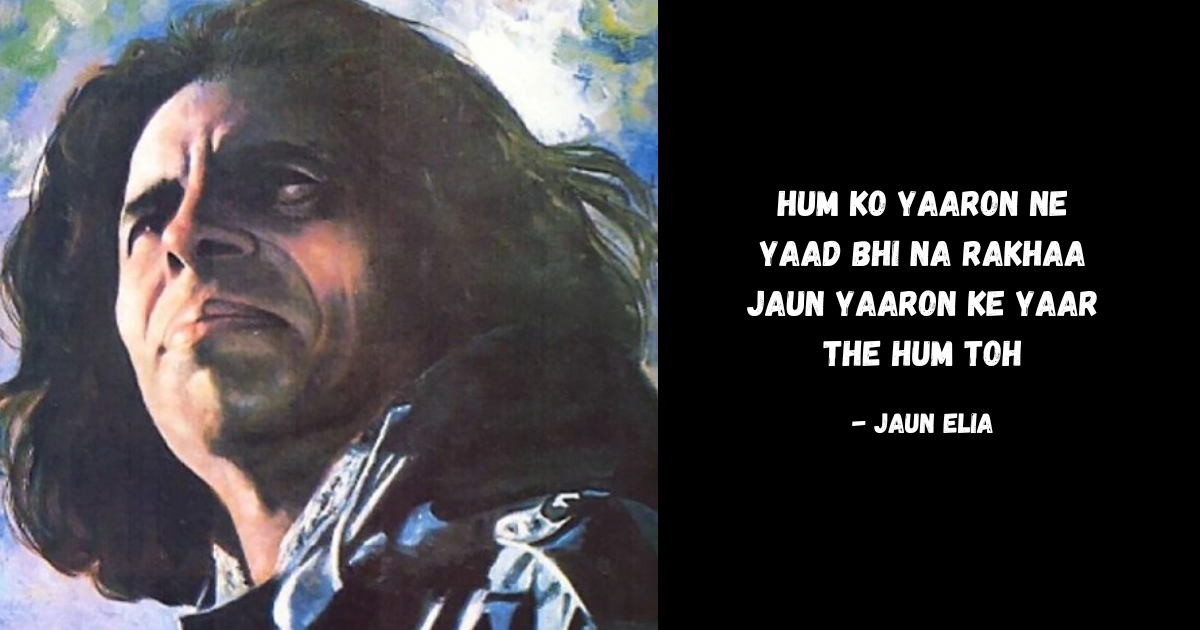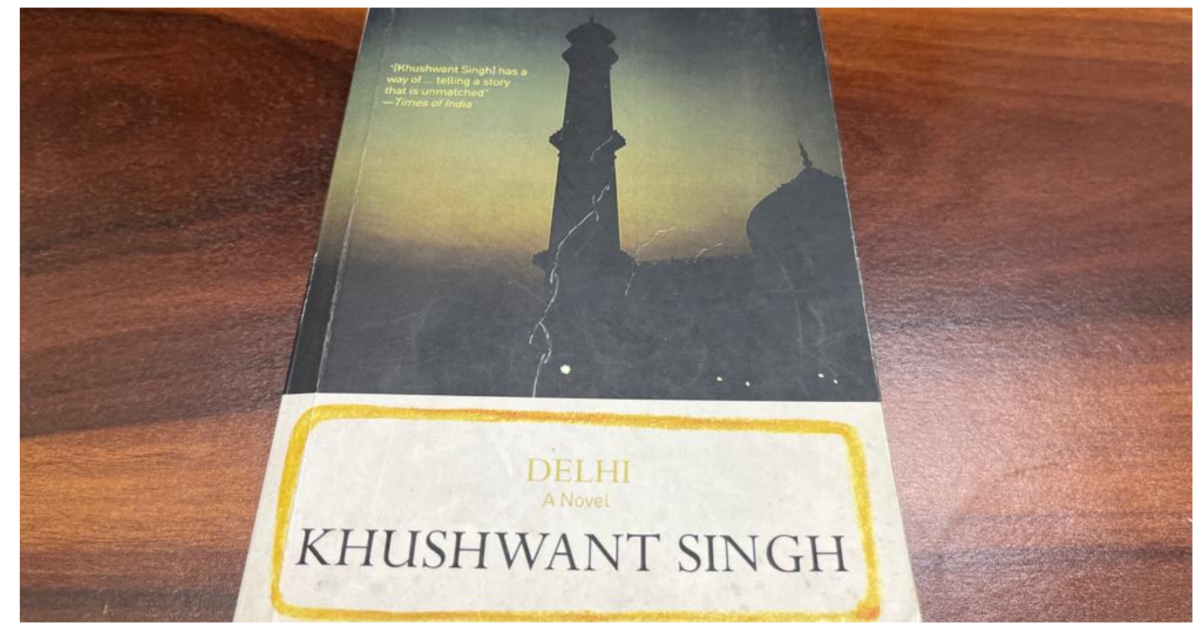The final and fifth day of the Jaipur Literature Festival opened with a scintillating Morning Music programme, presented in collaboration with the Ustad Imamuddin Khan Dagar, Indian Music Art and Culture Society, The Dagar Archives Museum Jaipur, and featured sitar and Surbahar player Souravbrata Chakraborty, accompanied by Aishwarya Ayadi on pakhawaj.
The fourth day of the Festival had concluded with a session featuring writer and film director Rick Stroud in conversation with journalist and best-selling author Shrabani Basu discussing the life and times of Noor Inayat Khan. Basu shed light on the eventful life of Khan, the descendant of Tipu Sultan, who was the only Asian secret agent in Europe during World War II. Basu talked about Khan being a Sufi, a writer of stories for children, a musician, a dreamer, but most of all, a woman who was determined to fight for the right cause. She also spoke about the importance of the radio and how Khan was the first woman wireless operator to be flown into occupied France during the War.

History at Jaipur Literature Festival
Art historian Katy Hessel and historian Alex von Tunzelmann discussed the historical documentation of art and Hessel’s attempts at dismantling patriarchy within the art world. The conversation revolved around her book, The Story of Art Without Men, reviving the legacy of women artists from the 1500s to the 21st century, and addressing the challenges that women artistes face to get the recognition they deserve. Speaking of what inspired her to write this book Hessel said, “…seven years ago…I walked into an art fair, looked at thousands of artwork in front of me and realised not a single one was by a woman… had I essentially been looking at the history of art from a male perspective?”
Conversations at JLF
Today at a Front Lawn session, internationally bestselling and award-winning author Simon Sebag Montefiore, in conversation with academic and author Tripurdaman Singh, discussed the inspiration of Sebag’s book and how he wanted to combine the elements of family unity with world history. While speaking about his book, Sebag said, “I always follow Benjamin Disraeli’s saying that if I want to read a book, I write it myself.” In the context of writing about world history, Montefiore said, “I think I realised the importance of history when I was in the wars at the end of the Soviet Union and I don’t think you can write a world history unless you have seen the downfall of an empire with your own eyes.” The conversation further revolved around discussing the downfall of the Soviet Union and the Russian invasion of Ukraine and the categorisation of various dynasties in Montefiore’s book.
Author Andrew Altschul; poet, novelist, literary journalist, translator, and communications professional Anupama Raju; and writer Ashok Ferrey were in conversation with author Vivek Tejuja, addressing the thin and porous lines between fiction and faction – borders that can blur the fixities of the stories they engage with and leave both the writer and the reader wondering where they stand. On the importance of writing fiction, Ferrey said, “…I think fiction is able to fix the truth in a way nonfiction can’t…”.
William Dalrymple’s take
Radio and TV journalist and recipient of the Penn Hessell Tiltman Award for History Book of the Year, Anita Anand, and historian and Festival Co-Director of Jaipur Literature Festival William Dalrymple, shared the idea behind their podcast – Empire. They further spoke about the editorial process and the research behind it. Anand said, “…there is this political wrestling match going on about what should or should not be said…it is not up for political debate… but there are some incontrovertible facts and we would like to give those to you.” Towards the end of the session, Anand noted that they are about to hit a massive milestone by crossing 5 million downloads of the podcast.
Writer Amit Chaudhuri, in conversation with fellow writer and poet Janice Pariat, discussed Amit’s latest book, Sojourn. During the session, Pariat narrated the overview of the book and laid the ground for the conversation. Chaudhuri’s Sojourn is a narrative that pushes our understanding of narrative techniques, told with musical prowess and literary dexterity. Talking about whether he finds his new novel unsettling, Amit exclaimed that Sojourn is not any more complex than anything else he has written and that the challenge was to write about history without making it something other than the lived moment.
At the Festival, a report titled The Million Missions Report had author Mathew Cherian; Co-founder of Dasra, Deval Sanghavi; founder, GuideStar India, Pushpa Aman Singh; author Kasturi Gandhi; academic Ankur Sarin; Director of the Society for Social and Economic Research (SSER), Jesim Pais and recipient of the Alternative Nobel Prize, Order of the Golden Ark, Global 500 Award of the UN and Earth Day International Award, Vandana Shiva, was released, at session moderated by Managing Director, Teamwork Arts and Festival Producer Sanjoy K Roy. The report was launched by the UN Resident Coordinator for India Shombi Sharp and Gayatri Nair Lobo.
The report emphasises the importance and contributions of the non-profit sector. Talking about the necessity for producing such a report, Roy said, “Many of us know today that the NGO and the NPA sector are at some risk… what this report has done is really looked at how you can make sure that we are telling a story of change, that we walk together with the governments of our time… in bringing about development”. The panellists discussed the important role of civil society in fulfilling the Sustainable Development Goals, Sharp said, “In India, we have seen important deliverables on education, on health, livelihoods, poverty reduction, to experiment, to innovate, to pave the way for new models of development delivery”. This was followed by a panel discussion on the report and the challenges in making it.
At the Bank of Baroda Charbagh, novelist Chigozie Obioma, in conversation with Editor-in-Chief at Penguin Random House India, Manasi Subramaniam, discussed Obioma’s upcoming book The Road to the Country. Obioma shared anecdotes from his childhood and the narratives that have formed his writing life. Sharing insights into Nigerian culture, languages, conflicts and the tenuous resolutions, he spoke about the multiple dimensions an ancient land has to cope with when taken over by colonialism. On his own experienceas a kid in Nigeria, Obioma said,“I came to writing by serendipity… I wanted to do something that was more vocational…I would lie in bed, my dad would or my mum would tell me stories…all of a sudden stories meant something different; it was like a major transformative epiphany…”
Poet, novelist, literary journalist, translator and communications professional, Anupama Raju, was in conversation with the debutant novelist, who wrote the part science fiction and part magic realistic, The Immortal King Rao, Vauhini Vara. The novel evokes a very scary world where our consciousness and memories can be evoked, and all brought into a vial that can be injected. The panel spoke about the way Vara has maintained a balance between the real and the dystopian.
JLF’s Jaipur BookMark
At a Jaipur BookMark session, founder of Chennai-based Aazhi Publishers and Ailaysa, a multilingual content and translation tech company, Senthil Natha; commissioning editor at DC Books, Govind Deecee; Founder & Managing Trustee of Neev School, Kavita Gupta Sabharwal; author Sabin Iqbal; short story writer, Shinie Antony; Director, Casa de la India, Dr. Guillermo Rodríguez Martín; co-founder and producer at the Bangalore Literature Festival, Srikrishna Ramamoorthy; executive director of JLF Colorado, Jessie Friedman; bilingual poet, author, translator, editor, publisher of Dhauli Books and director of Odisha Art & Literature Festival, Manu Dash; director of ITEF-Istanbul International Literature Festival, Mehmet Demirtas; Director, National Book Trust, India, Yuvraj Malik; and writer and journalist, Julia Wheeler, were
In conversation with Managing Director, Teamwork Arts and Festival Producer Sanjoy K. Roy. The session began with a keynote speech by award winning writer, publisher, and Festival Co-Director Namita Gokhale. In the context of starting a children’s literature festival, Deecee said, “We need to create the next generation of readers; we need to educate our readers.” Dermirtas and Roy discussed the future of literature festivals in India and the need for collaboration to create a more lively literary landscape for future generations.
Jamaican writer Marlon James, in conversation with politician, commentator and social activist Emily Benn, discussed James’ second book of a planned trilogy, Moon Witch, Spider King – a 2022 fantasy novel after Black Leopard, Red Wolf. On speaking about how he went about writing the book, James said, “It was a way to escape from the prison world, COVID was scary but COVID was also incredibly boring…”. The novel revolves around Sogolon (Moon Witch) who struggles against oppression, and ultimately gains a hard-won semi-freedom and a powerful portrayal of feminism, desire, power and survival.
Advocate Saurabh Kirpal, in conversation with academic and author Tripurdaman Singh, discussed Kirpal’s reasoning and inspiration behind the book, Fifteen Judgements: Cases that Shaped India’s Financial Landscape. Discussing how citizens are unaware of their rights that leads to the exploitation of their finances,Kirpal spoke about the relationship between law and finance.
Author of ten books on the history of Russia and Europe, Orlando Figes; internationally bestselling author of prize-winning books, Simon Sebag Montefiore in conversation with journalist, writer, and award-winning correspondent Luke Harding, discussed the complicated history of Russia. They also addressed the different concepts of power in Russia and how this has influenced Soviet and modern history. Most interestingly, the panel drew linkages of this understanding of history to Putin’s attack on Ukraine.
Chairman of the newly instituted Dalit Sahitya Akademi and member of the Legislative Assembly of West Bengal, Manoranjan Byapari, in conversation with Managing Director, Teamwork Arts and Festival Producer Sanjoy K. Roy, discussed Byapari’s life in prison where he learnt how to read and write, and subsequently became a writer in prison. Byapari spoke of his experiences with books, and how they permit the reader to travel wherever they wish—from the Himalaya to the depths of the ocean. As a political activist, he also spoke of how he has worked to improve the conditions of prisons.
Closing debate at JLF
The day concluded with Jaipur Literature Festival’s much-awaited signature Closing Debate. This year, the panellists debated whether the right and left divide can ever be bridged. The debate featured speakers such as member of Rajya Sabha Jawhar Sircar, literary historian and writer Purushottam Agarwal, recipient of the Alternative Nobel Prize, Order of the Golden Ark, Global 500 Award of the UN, and Earth Day International Awardee Vandana Shiva; poet, critic, novelist, columnist, and author of several books Makarand R Paranjape, writer-diplomat and politician Pavan K Varma and Rajya Sabha MP Priyanka Chaturvedi, and was moderated by columnist and television presenter Vir Sanghvi.
While Jawhar Sircar, Purushottam Agarwal and Vandana Shiva stood for the motion, Makarand R Paranjape, Pavan K Varma and Priyanka Chaturvedi opposed it. The proponents of the motion argued that the divide could not be bridged because the left opposed the oppression of people based on their caste, creed and gender and stood for change, while the right wish to further these inequalities by brushing these differences under the carpet. In line with this, Sircar stated, “[In the French Revolution] The ones who were in favour of change, gravitated to the left and ones who wanted monarchy, imperialism, the rights of the nobility, oppression, moved to the right. And that is the beginning of the term, left and right.” Shiva added to this, arguing that due to this fundamental difference, “The two spheres are incommensurable. They cannot meet unless you change the terms of the debate, unless you change the parameters.”
In his closing statement, Agarwal said, “…why is this fascination about bridge building between left and right?…every civilisation has a history and every phenomenon has a history. If you look at history…civilisation actually gets enriched by such conflicts, they do not enrich by removing these things or putting the realities under the carpet and therefore the left and right divide is bound to persist.”
The opponents of the motion argued in favour of the civilisational unity of India and that all sides needed to join hands for India’s progress. They also criticised the ideological purism inherent in the motion, saying that these distinctions are not applicable to India and do not exist in real politics. Chaturvedi said, “…the left and the right construct do not apply to the Indian governance model, India has its own construct… the country moves forward and the country’s concerns are supreme in a multicultural country like India in a diverse social set up like ours…it is not a choice”. Talking about how such distinctions have been traversed by politics parties, Varma noted, “It was the Congress that banned the RSS and perhaps rightly so in the 50s, but it was Pandit Jawahar Lal Nehru who invited the RSS to join the 1963 Republic Day parade because of the excellent work they did in supporting the government during the war with China”. Paranjape argued that violence and human rights violations have also taken place under ‘leftist’ regimes, and there is a need to work towards doing the ‘right’ things, not the ‘wrong’. Emphasising how the left and right do not apply to India, Chaturvedi said, “…the left and the right construct do not apply to the Indian governance model, India has its own construct… the country moves forward and the country’s concerns are supreme in a multicultural country like India…in a diverse social set up like ours…it is not a choice”.




